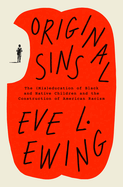
What is education for, or, better yet, who is it for? This is the central question that Eve L. Ewing, associate professor in University of Chicago's Department of Race, Diaspora, and Indigeneity, asks in Original Sins: The (Mis)Education of Black and Native Children and the Construction of American Racism. Ewing traces how education has become tied to conceptions of the American Dream, and how that dream, and the foundation of the country itself, is built on "two cornerstones": "the genocide and displacement of Indigenous peoples, and the institution of chattel slavery that held African people in bondage." "The schoolhouse," she writes, has "played a central role in furthering the work begun by slavery and settler colonialism." Ewing then demonstrates through stories, anecdotes of teaching, and copious research how that racialized dynamic exists still. She skillfully connects the normalization of standardized testing, academic tracking, under-resourcing, and various disciplinary policies and their unequal application to eugenics, race science, and policies of disenfranchisement with the intention of limiting the possibilities and potentials for Black and Indigenous students.
Ewing makes a convincing argument through her analysis and unparalleled storytelling that unless education in the United States is radically reconsidered, schools will simply continue to maintain the legacy of inequality at the core of the nation. Importantly, she concludes with suggestions for ways forward, including pointing out that none of the habits of cruelty are inevitable: "people made it, and people can unmake it." Ewing challenges readers to reimagine schools that will help Americans to reimagine the world, so long as they go forward with the knowledge of the past, and actively reconstruct it. --Michelle Anya Anjirbag, freelance reviewer

